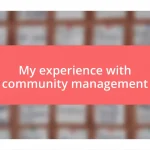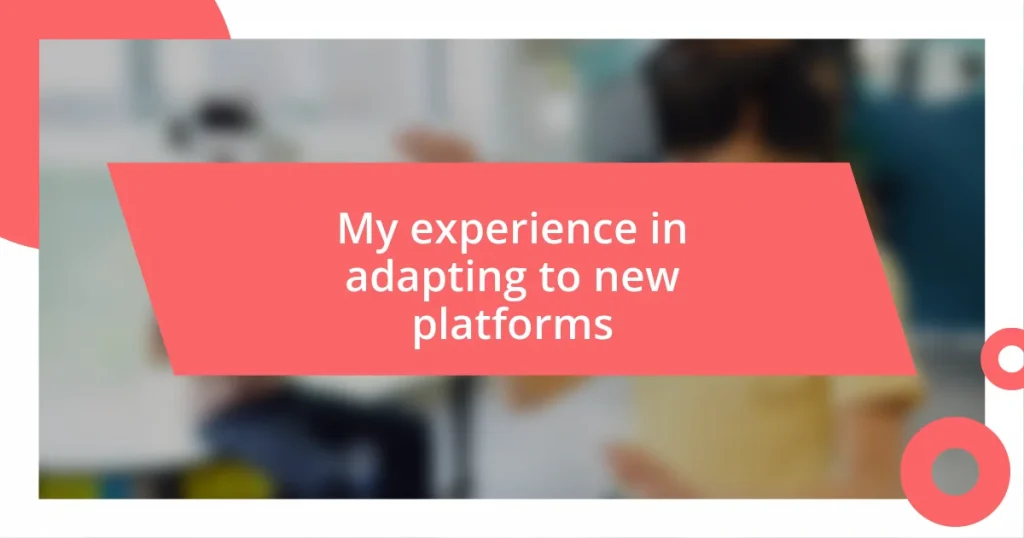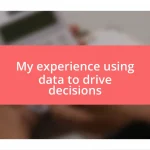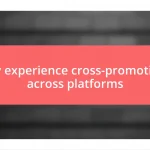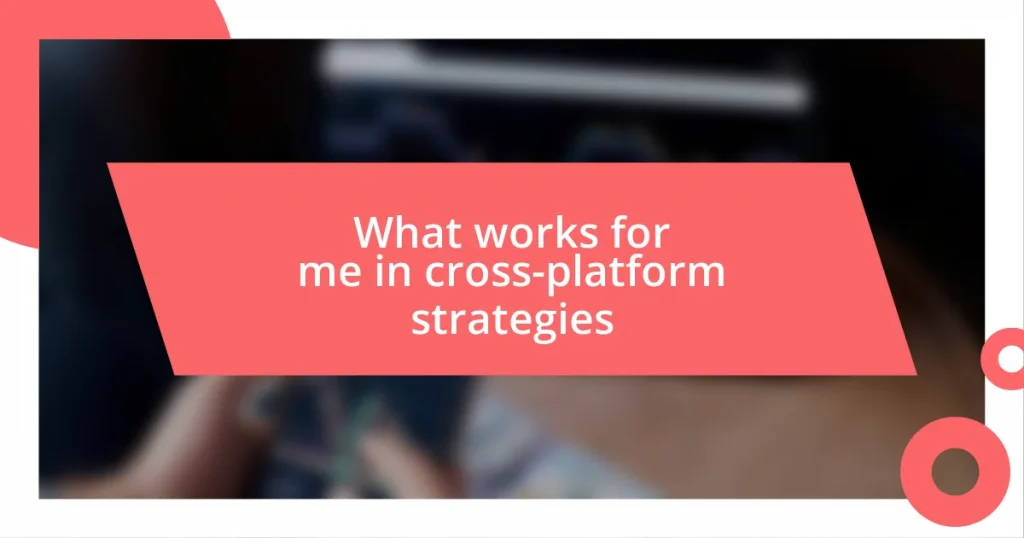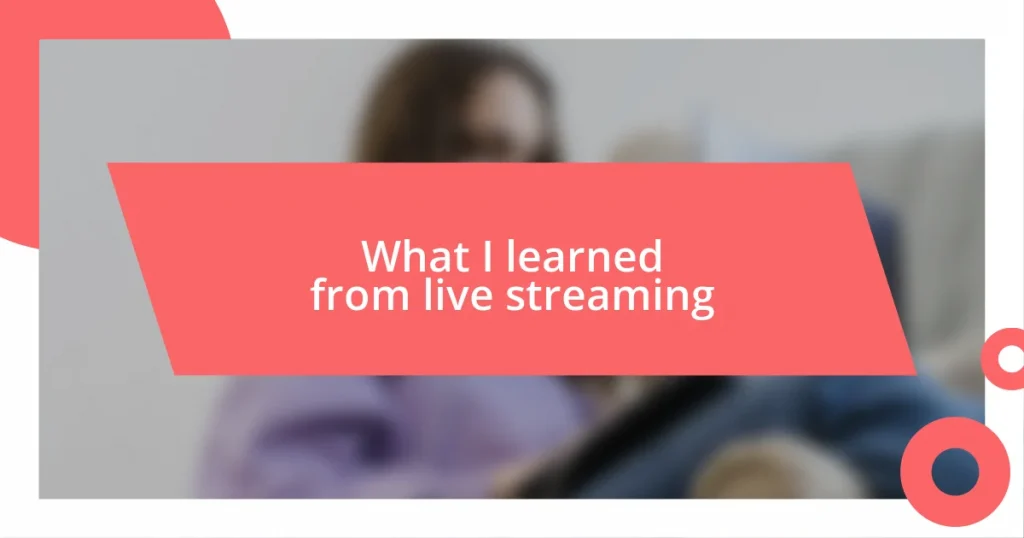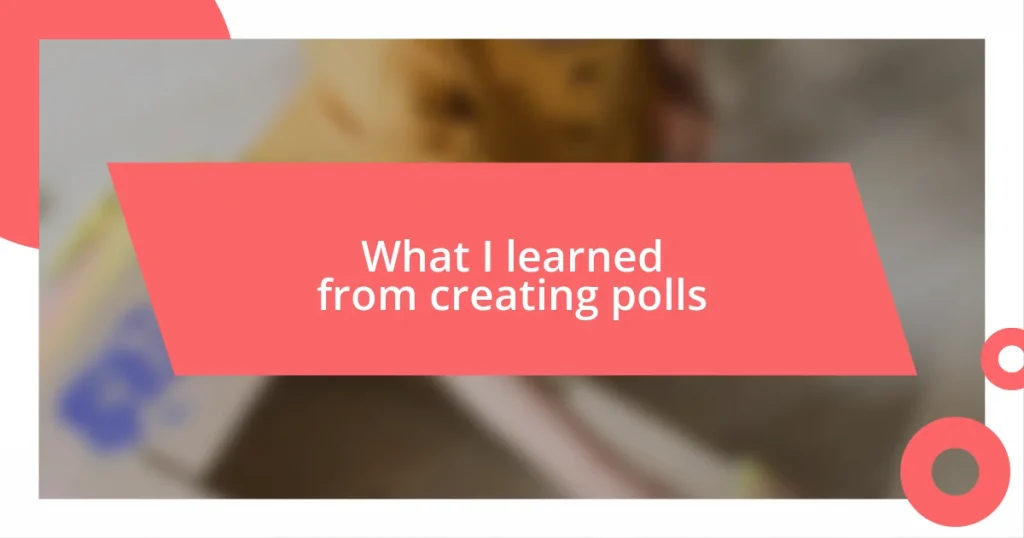Key takeaways:
- Embracing a growth mindset is crucial for adapting to new platforms; recognizing that every mistake can lead to valuable learning experiences fosters confidence.
- Setting realistic adaptation goals by breaking down the learning process into manageable steps enhances productivity and minimizes overwhelm.
- Utilizing resources such as community support, video tutorials, and online forums provides ongoing assistance, helping to navigate challenges more effectively.
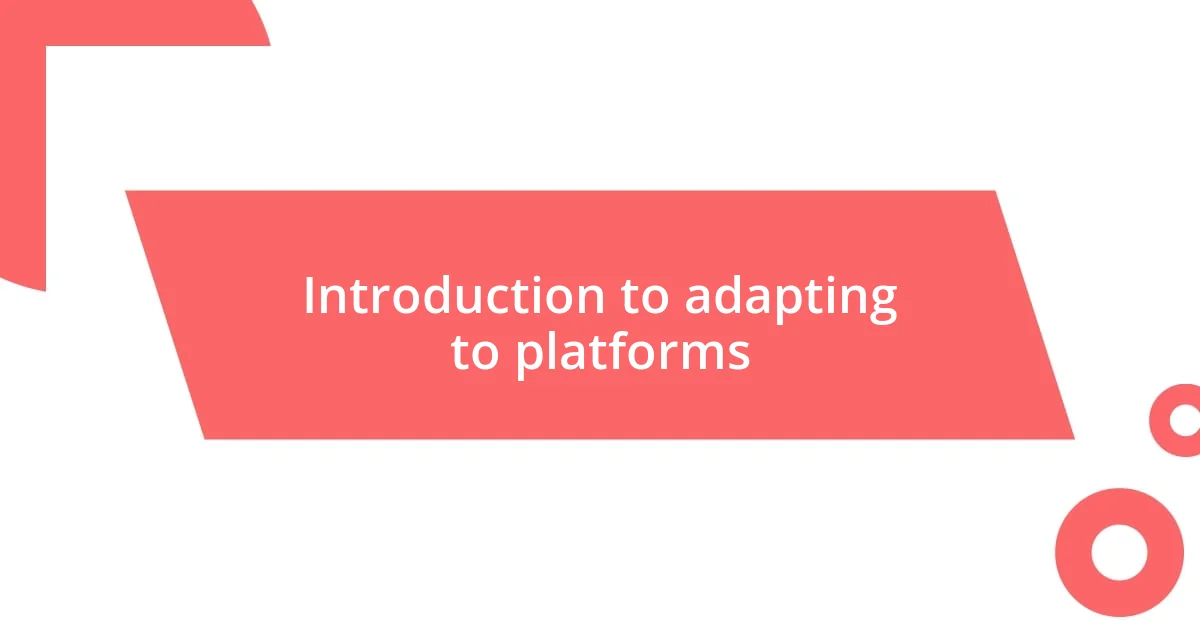
Introduction to adapting to platforms
Adapting to new platforms can feel overwhelming at first, can’t it? I remember when I was faced with switching to a completely different software for my work; my initial reaction was a mix of excitement and anxiety. Navigating unfamiliar interfaces and features brought back memories of my early tech struggles, reminding me that adaptation is often a journey filled with both challenges and triumphs.
The key to successful adaptation lies in embracing a growth mindset. I often tell myself that every platform has its own language and quirks. For instance, when I first started using a project management tool, it took a couple of trial-and-error sessions to grasp its functionalities. Yet, with every mistake, I learned something valuable, and my confidence grew. Isn’t it fascinating how each small victory adds up to a greater sense of mastery?
It’s important to recognize that adapting to new platforms isn’t just about the technical skills—it’s also about emotional resilience. I’ve experienced those moments of frustration, but then there’s that breakthrough when things finally click. Why do we resist change, even when it promises improvement? It’s a natural instinct, yet I’ve found that leaning into that discomfort often leads to unexpected growth and innovation. Each platform becomes another chapter in my learning journey, and embracing this mindset makes the process all the more rewarding.
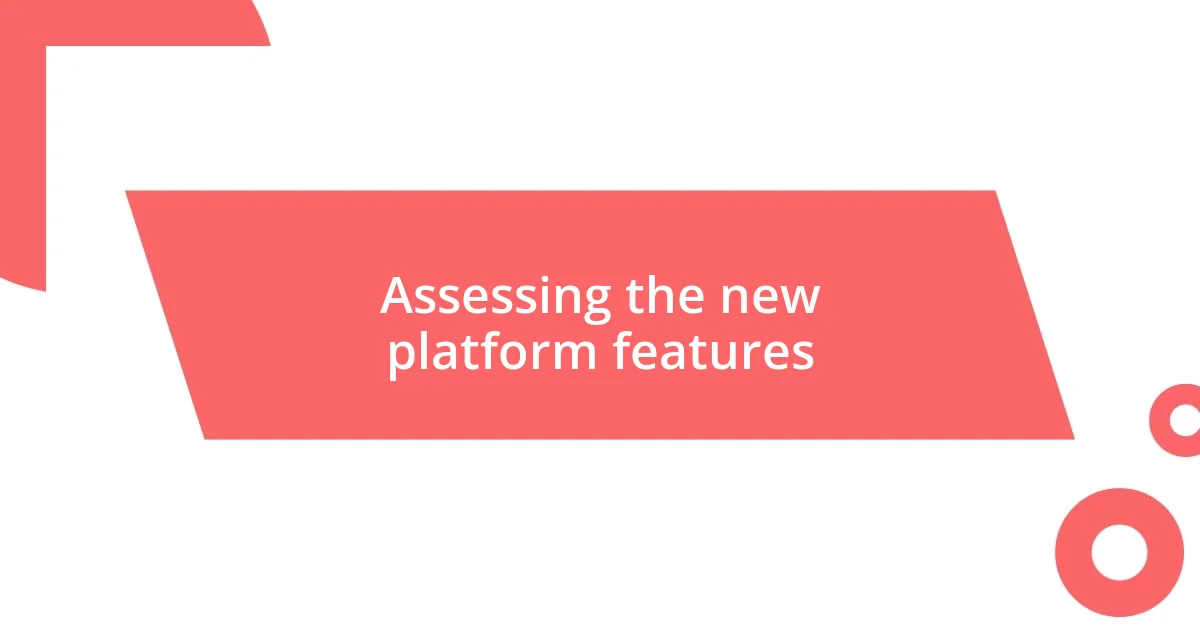
Assessing the new platform features
Assessing the features of a new platform is like peeling an onion—layer by layer, it can reveal incredible opportunities and some surprises. For me, the real turning point came when I took the time to explore each feature individually, rather than attempting to digest everything at once. There was a moment, after spending hours tangled in settings, when a simple dashboard feature suddenly clicked, making my workload feel lighter. I remember thinking how invaluable this could have been if I had discovered it sooner!
When I assess new platform features, I typically focus on these aspects:
- User Interface: Is it intuitive? Can I find what I need without too much searching?
- Customization Options: Can I tailor the platform to fit my workflow and preferences?
- Integration Capabilities: How well does it connect with other tools I already use?
- Support and Resources: What kind of help is available if I get stuck?
- Scalability: Will it grow with my needs over time?
These insights have not only enhanced my productivity but have also shaped my overall experience with the platform. Embracing a step-by-step approach helped mitigate some initial anxiety, making the process feel more manageable.
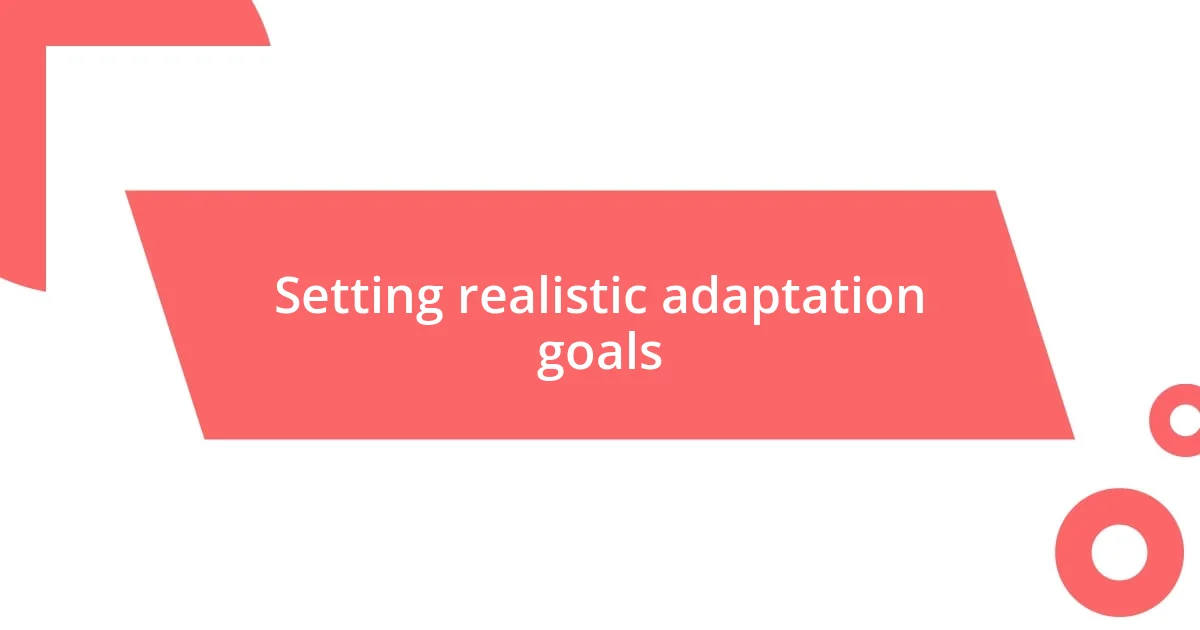
Setting realistic adaptation goals
When setting realistic adaptation goals, I find it essential to start small. Rather than overwhelming myself with the entirety of a new platform, I break my learning process into achievable chunks. For instance, when I began using a new communication tool, my first goal was simply to familiarize myself with sending messages and using basic features. That initial focus made it less intimidating and allowed me to celebrate little wins, like mastering the chat function before diving into video calls.
As I progressed, I adjusted my goals based on my experiences. I remember one week in particular when I dedicated just ten minutes a day to explore one new feature. By the end of the week, I had a clearer grasp of how to utilize it effectively, which not only boosted my confidence but also improved my efficiency. Setting these incremental goals transformed my adaptation journey into a series of manageable steps rather than an overwhelming avalanche of information.
Moreover, I believe it’s crucial to be patient and forgiving during this process. There were times when I felt frustrated, especially when things didn’t click immediately. I’ve learned that it’s perfectly natural to stumble. Adjusting my goals to reflect my pace of learning turned those frustrations into valuable lessons. By embracing the idea that adaptation is a process rather than a race, I found myself enjoying the learning journey much more.
| Adaptation Goal Type | Description |
|---|---|
| Small Steps | Focus on one feature at a time to avoid feeling overwhelmed. |
| Daily Exploration | Set aside a few minutes each day to learn and practice. |
| Flexible Adjustment | Reevaluate and adjust goals based on progress and comfort level. |
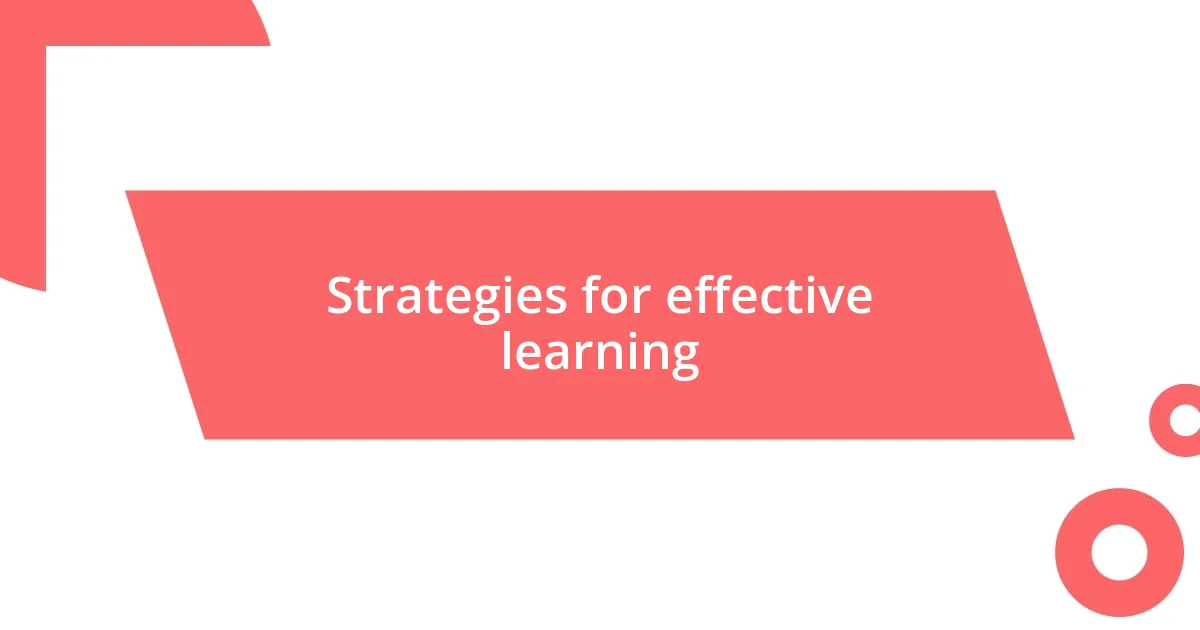
Strategies for effective learning
When I think about effective learning strategies, one of the first things that comes to mind is the importance of hands-on practice. For example, I recall when I first encountered a new project management tool. Instead of just reading about its features, I decided to dive in and create a mock project. This practical experience not only solidified my understanding but also made me realize the tool’s potential in ways that theoretical learning simply couldn’t. Isn’t it fascinating how engaging with a platform directly can illuminate aspects that might otherwise go unnoticed?
Another strategy that has worked wonders for me is seeking out community support and resources. Joining forums or user groups often provides insights that formal documentation misses. I remember attending an online workshop where experienced users shared their shortcuts and hacks—it was a game-changer! Those shared experiences not only helped me navigate the platform better but also fostered a sense of belonging. Have you ever felt the thrill of learning something new from someone who’s been in your shoes?
Lastly, maintaining a reflective practice can significantly enhance your learning process. After a learning session, I often jot down what I struggled with and what I found exciting. This practice helps me see my progress and identify areas for improvement. I distinctly remember the first time I reviewed my notes after a week of adaptation; I was genuinely surprised at how much I had absorbed. It’s like holding a mirror to your experience—what insights might you uncover about your own learning style?
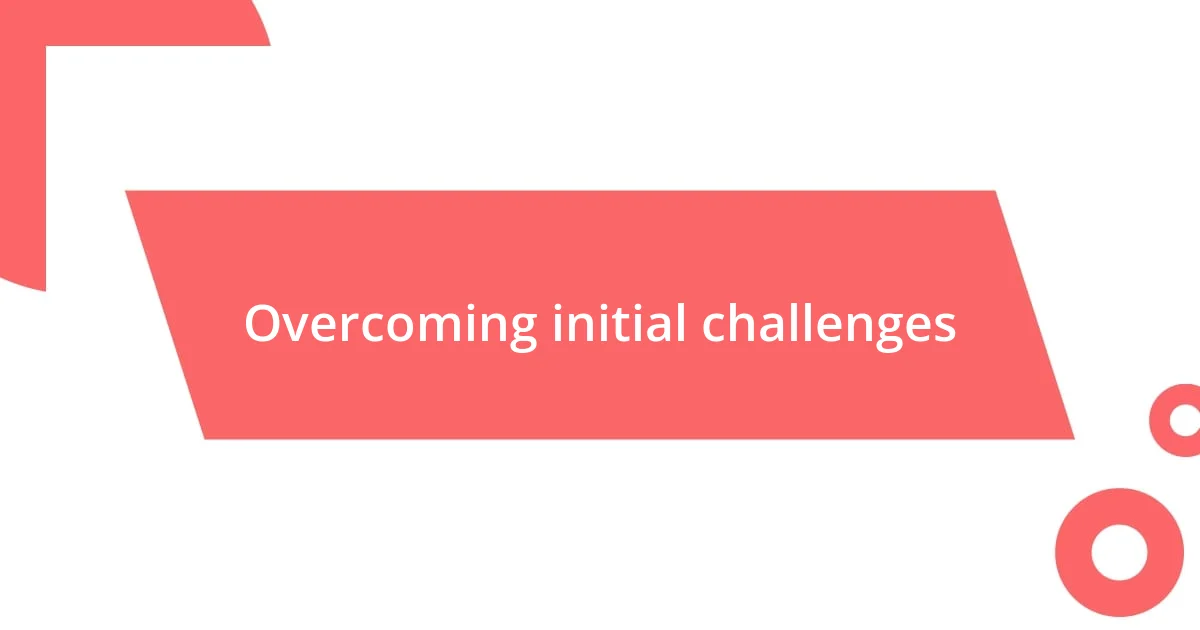
Overcoming initial challenges
Adapting to new platforms can feel daunting, and I’ve faced my fair share of hurdles. One of the biggest challenges I encountered was navigating the initial settings and configurations. I remember feeling that overwhelming sense of confusion, like being thrown into the deep end without a life jacket. However, I took a break and revisited the basics, slowly piecing together the necessary tweaks. It’s amazing how taking a step back can offer clarity—have you ever experienced that moment where everything suddenly clicks?
Another challenge I often faced was the fear of making mistakes. In my early days with a new design software, I hesitated to experiment, worrying I’d break something important. But there was a moment when I decided to let go of that fear—what if I viewed mistakes as stepping stones instead of roadblocks? I began playing around without holding back, and each error turned into a lesson that enhanced my skills. That shift in mindset not only helped me adapt faster but made the whole process enjoyable.
Lastly, one of the tougher aspects was overcoming the initial sense of isolation. I distinctly recall the days where I was troubleshooting alone, feeling like I was in a bubble. To combat that, I reached out to colleagues who were also learning the platform. Seeing their struggles mirrored my own was a comfort, and sharing tips turned those lonely battles into collaborative journeys. Isn’t it incredible how connection can make the toughest challenges seem a little lighter?
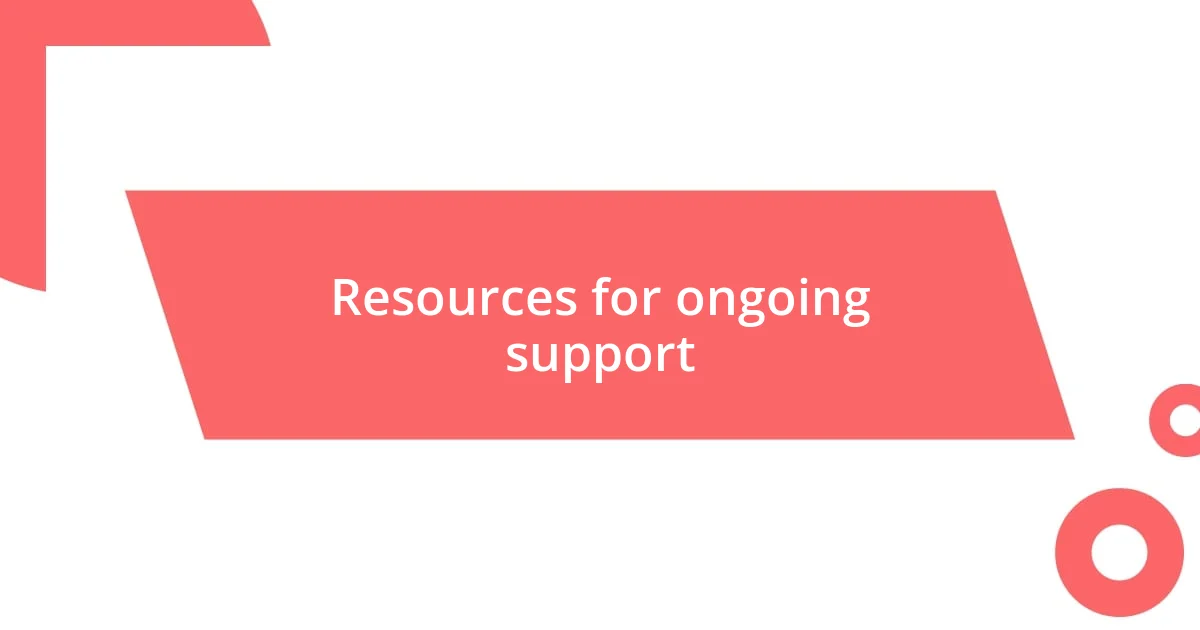
Resources for ongoing support
Finding ongoing support is crucial when adapting to new platforms, and I’ve discovered several invaluable resources along the way. One of my favorite go-to tools has been video tutorials on platforms like YouTube or dedicated educational sites. I can’t tell you how often I’ve paused and replayed sections to grasp tricky concepts. It’s like having a friendly expert at my fingertips, guiding me step by step. Have you ever found a video that just clicked with you?
Moreover, I’ve heavily relied on local user groups and meetups. There’s something magical about connecting with people face-to-face who share the same learning journey. I remember attending a small group discussion where we exchanged tips over coffee. It was refreshing to hear how others tackled similar challenges—it transformed my perspective and equipped me with techniques I hadn’t considered. Reflecting on those experiences, have you ever felt the power of shared understanding lifting your spirits?
Additionally, I’ve found that leveraging online resources such as FAQs, forums, or specialized platforms like Reddit can be a treasure trove of support. I often find myself diving into a thread when I hit a snag, and the community’s insights make problems seem much less intimidating. I recall a particularly frustrating moment when I couldn’t figure out a feature. After scrolling through a forum, I stumbled upon a user’s breakdown that made everything click into place. It’s moments like these where collective knowledge proves just how supportive the digital community can be. What resources have you uncovered that helped reduce the stress of learning anew?
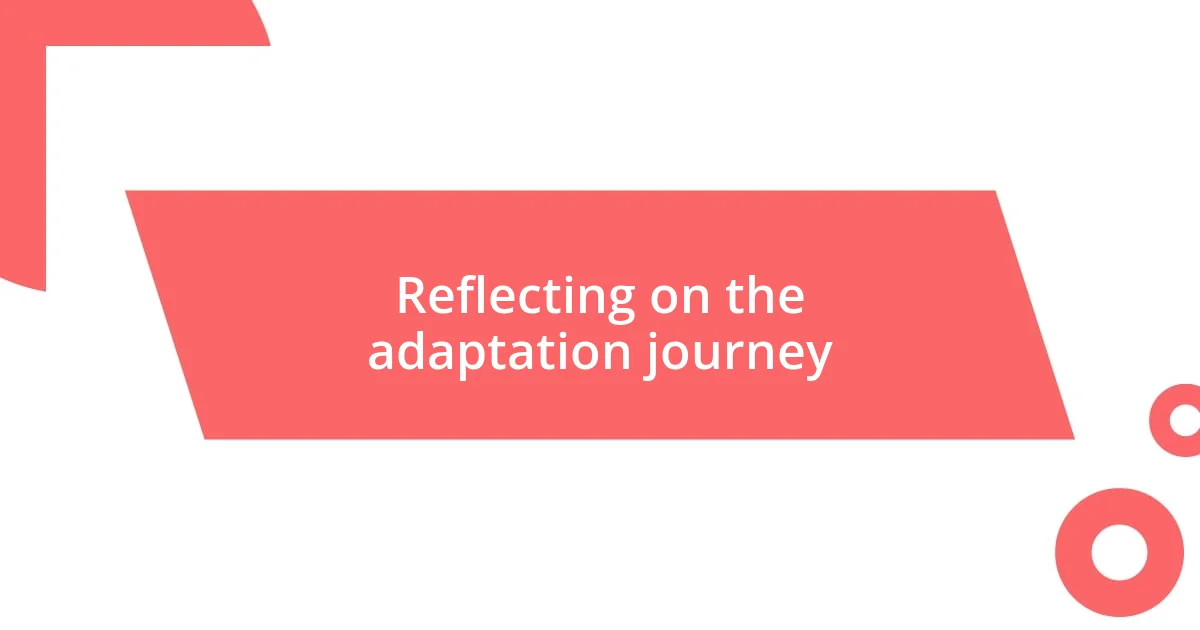
Reflecting on the adaptation journey
Reflecting on my adaptation journey, I realize that every platform comes with its own unique set of challenges and rewards. I often think back to moments when I hit roadblocks, feeling frustrated and wondering if I’d made a mistake in choosing to learn something new. I remember one particular night, hunched over my laptop, still grappling with the nuances of a graphic design tool. In that moment, was it worth it? Surprisingly, as dawn broke, and I finally cracked that one elusive function, the sense of accomplishment was palpable. It reminded me that persistence, even in the face of doubt, can lead to breakthroughs.
As I navigated different platforms, I also became aware of the emotional rollercoaster involved in the process. There were instances where I felt utterly defeated—like that time I spent hours trying to make a simple edit, only to realize I hadn’t saved my progress. That disappointment hit hard. Yet, reflecting on those experiences now, I see how they’ve shaped my resilience. Each setback taught me the importance of patience and the value of self-forgiveness. Have you felt that same sting before? It’s disheartening, but it can also be a powerful teacher.
Looking back, I appreciate the small victories that marked my journey. Every completed project, no matter how minor, contributed to building my confidence. There were nights when I shared my achievements with friends, bubbling with excitement, as I explained what I had learned. Those interactions made me realize how essential it is to celebrate progress, however small it might seem. Isn’t it fascinating how reflecting on our personal victories can fuel our motivation to tackle future challenges?









